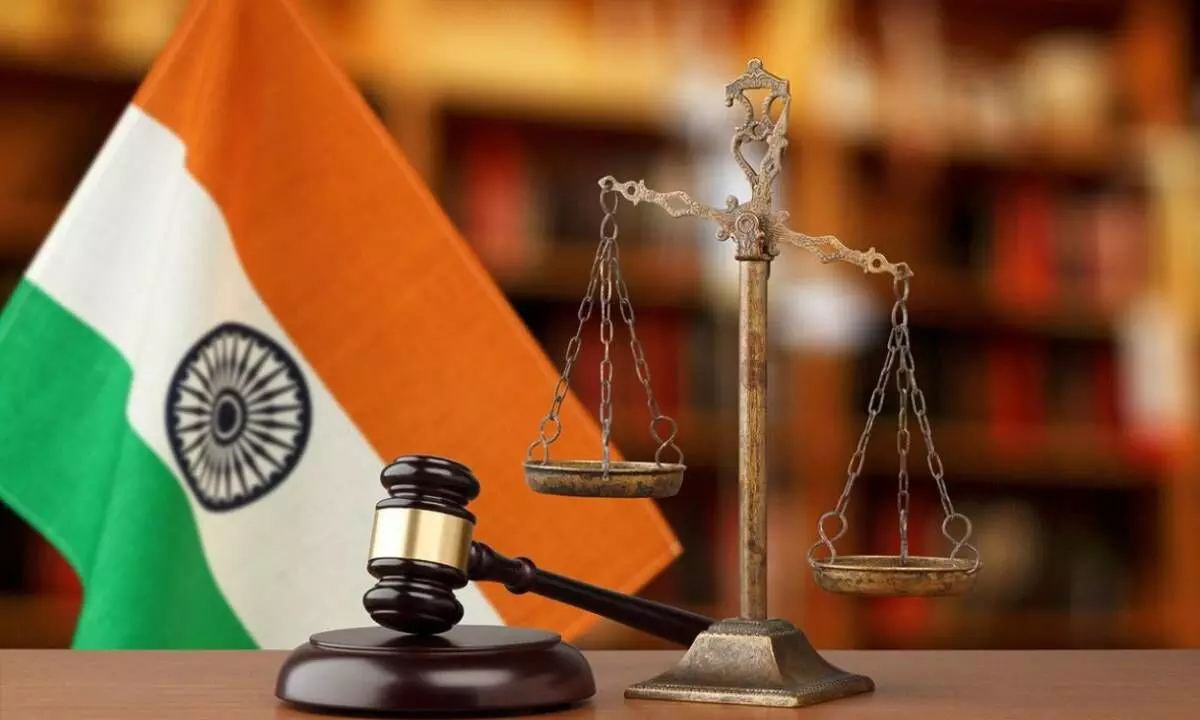Timely justice holds key to sustainable economic growth, inclusive social order
Over 4.70 crore cases pending in various courts, including 70,154 in SC
image for illustrative purpose

Justice is not explicitly listed as one of the Sustainable Development Goals (SDGs) adopted by all member states of the United Nations in 2015 as a part of the 2030 Agenda for Sustainable Development, aiming to address a wide range of global challenges like poverty, inequality, climate change, environmental degradation, peace and prosperity. However, there is not even an iota of doubt as to how the elements of justice are indirectly connected to several of SDGs, especially those pertaining to social, economic, and environmental issues.
In a country like India where 80 crore are getting free food grains under the Pradhan Mantri Garib Kalyan Ann Yojana (PMGKAY), justice, peace and strong institutions, also 16th SDG, would go a long way in reducing hardships, improving the ease of living and ensuring fair distribution of resources and opportunities among all. An effective, accountable, and inclusive governance at all levels means nothing less than promoting gender equality, ending discrimination and guaranteeing equal access to facilities and privileges for all.
A faster delivery of justice by the courts plays a vital role in building an inclusive social and economic order. This will also ensure upholding the rule of law and ensuring access to justice for all citizens.
Delays in the judicial process not only cause immense frustration and inconvenience to litigants but also erode public trust in the judiciary.
Union Law Minister Arjun Ram Meghwal informed the Rajya Sabha on July 20 that cases pending in various courts in the country have crossed the five-crore mark. Data from the Integrated Case Management System (ICMIS) shows that as on July 1, there are 69,766 cases pending in the Supreme Court, while in the high courts and district and subordinate courts, as on July 14, the figure stood at a staggering 60,62,953 and 4,41,35,357, respectively.
Experts opine that pendency of cases in courts can be attributed to several factors like shortfall of judges and judicial officers, supporting court staff and physical infrastructure, complexity of facts involved, nature of evidence and cooperation of stakeholders like the Bar, investigation agencies, witnesses and litigants. The absence of a prescribed time frame for disposing cases, frequent adjournments and lack of adequate arrangement to monitor, track and bunch cases for hearing also contribute to the inordinate delays.
On March 25, 2022, the then Law Minister Kiren Rijiju had informed the Lok Sabha that over 4.70 crore cases were pending in various courts in the country, including 70,154 in the Supreme Court. The total number of cases pending in the 25 high courts stood at 58,94,060 as on March 21, 2022. Rijiju added that 4,10,47,976 cases are pending in various district and subordinate courts.
None of us will disagree with the need for having a more efficient and expeditious justice system in the country. It is imperative to invest in modernizing court infrastructure, implementing technology-driven solutions and streamlining judicial procedures. The appointment of more judges and support staff, along with promotion of alternative dispute resolution mechanisms, can significantly contribute to reducing the backlog of cases. By prioritizing the speedy resolution of disputes, we can strengthen the foundation of our legal system and uphold the fundamental principles of fairness and equality before the law.
Equally important is the element of inclusivity in the appointment of judges, a point which Rijiju raised in a written reply in the Lok Sabha on March 24, 2023. He said: Appointment of Judges of the High Courts is made under Articles 217 and 224 of the Constitution of India, which do not provide for reservation for any caste or class of persons. However, the government is committed to social diversity in the appointment of judges in the higher judiciary.
As per the information provided by the recommendees, out of 575 High Court judges appointed since 2018, 67 belong to the OBC category, 17 belong to the SC category, nine belong to ST category and 18 belong to minority.”
Meghwal, responding to a question by AIMIM member Asaduddin Owaisi, had on July 21 said that three out of four judges appointed to high courts in the country since 2018 are from upper-caste communities. In precise terms, 458 out of 604 (75.68 per cent) judges appointed from 2018 to July 17, 2023 were from the general category.
Not denying the fact that inclusivity of every institution is paramount, one cannot ignore the nation’s collective failure in learning from past mistakes and building a robust institutional and social ecosystem that acts as a deterrent against any heinous acts.
We need to pause and reflect on what we have learnt as a society from the naked parade of Phoolan Devi to the shooting of Manorma Devi, which triggered the naked protests by women in front of Kangla Fort in Manipur, and burning of Graham Staines, a 58-year-old Australian missionary and his two sons on the intervening night of January 22-23, 1999 in Odisha. Needless to say, creating a responsible and inclusive socio-economic order is a serious business and requires the involvement of all stakeholders.
(The writer is a senior journalist, columnist and author. The views expressed are strictly his personal)

